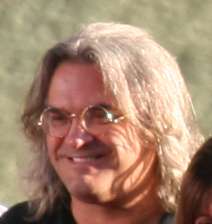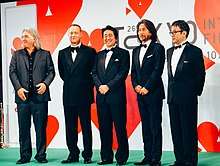Paul Greengrass
Paul Greengrass (born 13 August 1955) is an English film director, film producer, screenwriter, and former journalist. He specialises in dramatisations of historic events and is known for his signature use of hand-held cameras.
Paul Greengrass | |
|---|---|
 Greengrass at the Bourne Ultimatum premiere at the Cinerama Dome in Hollywood, California on 25 July 2007 | |
| Born | 13 August 1955 |
| Alma mater | Queens' College, Cambridge |
| Occupation | Film director, screenwriter, producer |
| Years active | 1978–present |
| Board member of | Directors UK (president) |
His early film Bloody Sunday (2002), about the 1972 shootings in Derry, Northern Ireland, won the Golden Bear at 52nd Berlin International Film Festival. Other films he has directed include three in the Bourne action/thriller series: The Bourne Supremacy (2004), The Bourne Ultimatum (2007), and Jason Bourne (2016); United 93 (2006), for which he won the BAFTA Award for Best Director and received an Academy Award for Best Director nomination; Green Zone (2010); and Captain Phillips (2013). In 2004, he co-wrote and produced the film Omagh, which won British Academy Television Award.
In 2007, Greengrass co-founded Directors UK, a professional organization of British filmmakers, and was its first president until 2014. In 2008, The Telegraph named him among the most influential people in British culture.[1] In 2017, Greengrass was honoured with a British Film Institute Fellowship.[2][3]
Early life
Greengrass was born 13 August 1955 in Cheam, Surrey, England. His mother was a teacher and his father a river pilot and merchant seaman.[4][5] His brother, Mark Greengrass, has become a noted English historian.
Greengrass was educated at Westcourt Primary School, Gravesend Grammar School and Sevenoaks School, and attended Queens' College, Cambridge. He studied English Literature at the same time as Roger Michell.[6]
Career
Journalism
Greengrass first worked as a director in the 1980s, for the ITV current affairs programme World in Action; his investigation of timber-framed house construction has been cited as preventing its widespread adoption in Britain.[7] At the same time he co-authored the book Spycatcher (1987) with Peter Wright, former assistant director of MI5. It contained enough sensitive information that the British Government made an unsuccessful attempt to ban it.[4]
Film

Greengrass moved into drama, directing non-fiction, made-for-television films such as The One That Got Away, based on Chris Ryan's book about SAS actions in the Gulf War and The Fix, based on the 1964 betting scandal that shook British football.
His 1998 film The Theory of Flight starred Kenneth Branagh and Helena Bonham Carter, who played a woman with motor neurone disease. The film dealt with the difficult issue of the sexuality of people with disabilities.
Greengrass directed The Murder of Stephen Lawrence (1999), an account of Stephen Lawrence, a black youth whose murder was not properly investigated by the Metropolitan Police. His mother's investigations resulted in accusations about institutional racism in the police.
Bloody Sunday (2002), depicted the 1972 Bloody Sunday shootings of Irish anti-internment activists by British soldiers in an almost documentary style; it shared First Prize at the 2002 Berlin Film Festival with Hayao Miyazaki's Spirited Away. Bloody Sunday was inspired by Don Mullan's politically influential book Eyewitness Bloody Sunday (Wolfhound Press, 1997). A schoolboy witness of the events of Bloody Sunday, Mullan was co-producer and appeared as a figure in Bloody Sunday..
In 2004, Greengrass co-wrote the television film Omagh with Guy Hibbert. Based on the bombing of 1998, the film was a critical success, winning British Academy Television Award for Best Single Drama. This was the first professional film that Greengrass had not directed; he was credited as a writer and producer. He had been working on The Bourne Supremacy. The film was directed by Pete Travis. It was the second film Greengrass had written about terrorism and mass killing in Ireland after Bloody Sunday.
Based on that film, Greengrass was hired to direct 2004's The Bourne Supremacy, a sequel to the 2002 film The Bourne Identity. The first film's director, Doug Liman, had left the project. The film starred Matt Damon as Jason Bourne, an amnesiac who realises he was once a top CIA assassin and is being pursued by his former employers. An unexpectedly major financial and critical success, it secured Greengrass's reputation and ability to get his smaller, more personal films made.
In 2006, Greengrass directed United 93, a film based on the 11 September 2001 hijacking of United Airlines Flight 93. The film received critical acclaim, particularly for Greengrass' quasi-documentary-style. After receiving many Best Director awards and nominations from critics' circles (including the Broadcast Film Critics Association), Greengrass won the BAFTA award for Best Director at the 60th British Academy Film Awards and received an Oscar nomination for Achievement in Directing at the 79th Academy Awards. For his role in writing the film, he earned the Writers Guild of America Award and BAFTA nominations for Best Original Screenplay.
He returned to the money-making Bourne franchise. The Bourne Ultimatum, released in 2007, was an even bigger success than the previous two films. He was nominated for BAFTA Best Director at the 61st British Academy Film Awards.
In 2007, he co-founded Directors UK, a professional association for British directors. He served as founding president until July 2014.[8][9]
Greengrass's Green Zone stars Matt Damon as the head of a U.S. military team on an unsuccessful hunt for weapons of mass destruction in post-war Iraq. It was filmed in Spain and Morocco and released in 2010.[10] The film was first announced as based on the bestselling, award-winning non-fiction book Imperial Life in the Emerald City, by Rajiv Chandrasekaran, the Washington Post's Baghdad bureau chief. But the final film is a largely fictionalised action thriller only loosely inspired by events in the book.
Captain Phillips, Greengrass's film about the Maersk Alabama hijacking in 2009, was based on the book A Captain's Duty. It starred Tom Hanks, Barkhad Abdi, and Faysal Ahmed. It was shot in 2012 in Massachusetts and Virginia in the United States, and Malta. It was released in 2013.
Greengrass returned to direct the fifth Jason Bourne film, Jason Bourne, with Damon starring again. The film was released on 29 July 2016.[11]
In 2017, Greengrass began filming 22 July, a docudrama film following the 2011 Norway attacks perpetrated by Anders Behring Breivik and their aftermath, on location in Norway. The film was released on Netflix and in select theaters on October 10, 2018.[12]
Personal life
Greengrass has said that he professes irreligion but has "great respect for the spiritual way".[13]
He is a supporter of Crystal Palace FC. He has had many banter-filled football chats on the Mayo & Kermode Film Programme when publicising his films.
Filmography
Films
| Year | Film | Credited as | Notes | ||
|---|---|---|---|---|---|
| Director | Writer | Producer | |||
| 1989 | Resurrected | Yes | |||
| 1998 | The Theory of Flight | Yes | |||
| 2002 | Bloody Sunday | Yes | Yes | ||
| 2004 | The Bourne Supremacy | Yes | |||
| 2006 | United 93 | Yes | Yes | Yes | BAFTA Award for Best Direction Nominated — Academy Award for Best Director Nominated — BAFTA Award for Outstanding British Film Nominated — Broadcast Film Critics Association Award for Best Director |
| 2007 | The Bourne Ultimatum | Yes | Nominated — BAFTA Award for Best Direction Nominated — BAFTA Award for Outstanding British Film | ||
| 2010 | Green Zone | Yes | Yes | ||
| 2013 | Captain Phillips | Yes | Empire Inspiration Award Nominated — BAFTA Award for Best Direction Nominated — Directors Guild of America Award for Outstanding Directing – Feature Film Nominated — AACTA International Award for Best Direction Nominated — Broadcast Film Critics Association Award for Best Director Nominated — Golden Globe Award for Best Director | ||
| 2016 | Jason Bourne | Yes | Yes | Yes | |
| 2018 | 22 July | Yes | Yes | Yes | |
| 2020 | News of the World | Yes | Yes | ||
| 2022 | 1984 | Yes | |||
Television
| Year | Film | Credited as | Notes | ||
|---|---|---|---|---|---|
| Director | Writer | Producer | |||
| 1984-1987 | World in Action | Yes | Yes | Documentary television series (Director in 2 episodes / Producer in 10 episodes) | |
| 1992 | Cutting Edge | Yes | Yes | Documentary television series (Episode: "Coppers") | |
| 1993 | Crime Story | Yes | Yes | Television series (Episode: "When the Lies Run Out: The Ian Spiro Story") | |
| 1994 | Open Fire | Yes | Yes | Television film | |
| 1995 | Kavanagh QC | Yes | Television series (Episode: "The Sweetest Thing") | ||
| The Late Show | Yes | Yes | Documentary television series (Episode: "Sophie's World") | ||
| 1996 | The One That Got Away | Yes | Yes | Television film | |
| 1997 | The Fix | Yes | Yes | Television film | |
| 1999 | The Murder of Stephen Lawrence | Yes | Yes | Television film | |
| 2004 | Omagh | Yes | Yes | Television film; British Academy Television Award Best Single Drama | |
References
- "The 100 most powerful people in British culture: 41-60". The Daily Telegraph. 18 March 2016.
- "Paul Greengrass to receive BFI Fellowship at BFI London Film Festival Awards Ceremony". British Film Institute. 29 August 2017. Retrieved 29 August 2017.
- "Harvey Weinstein's Shadow Hangs Over London Film Festival Awards". What's Worth Seeing. Retrieved 14 October 2017.
- Thorpe, Vanessa (5 August 2007). "Hollywood's Favourite Brit". The Guardian. London. Retrieved 16 February 2009.
- Brown, Mick (4 August 2007). "Straight shooting". The Daily Telegraph. London. Retrieved 22 May 2010.
- "Paul Greengrass: Greengrass was made an Honorary Fellow of Queens'College in 2008. Description". AMC. Archived from the original on 22 September 2017. Retrieved 30 December 2015.
- Sutherland, Lyall (2 December 2004). "The timber-frame two and the wild, wild net". Architects' Journal.
- "Paul Greengrass steps down as Directors UK President". Directors UK. 25 July 2014.
- "Inside Story: In the right direction - the cream of Britain's television directing talent". The Independent. 16 June 2008. Retrieved 3 August 2011.
- Garrett, Diane (6 June 2007). "Damon, Greengrass re-teaming". Variety. Retrieved 22 January 2008.
- Eisenberg, Eric (19 October 2015). "Matt Damon Will Be Jason Bourne Again, Here Are The Details". Cinema Blend.
- Fleming Jr, Mike. "Netflix Lands Paul Greengrass Pic About Norwegian Terrorist Who Killed 77". Deadline Hollywood. Retrieved 30 October 2017.
- Carnevale, Rob. "Calling the Shots: No.40: Paul Greengrass". BBC. Retrieved 23 March 2017.
External links
| Wikimedia Commons has media related to Paul Greengrass. |
- Paul Greengrass on IMDb
- BAFTA Interview with Paul Greengras, Latitude Festival, 2010